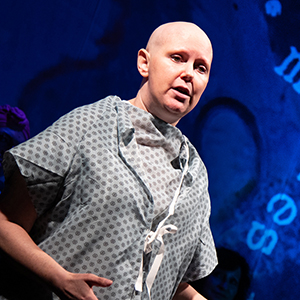-
Second DCIS Diagnoses May Not Be Related to Initial Lesion
DNA sequencing found that in many cases when DCIS recurred, the lesion was unrelated to the first diagnosis, raising questions about how to best treat recurrence.
by Eric Fitzsimmons
-
How COVID-19 Changed Cancer Care
A new report from the American Association for Cancer Research explores how the COVID-19 pandemic affected cancer patients, researchers and care providers.
by Eric Fitzsimmons
-
Need a Ride?
Cancer center expands pilot program to provide transportation for patients to get to appointments.
by Karen Blum
-
Cancer, On and Off Stage
Erin Cronican, who has stage IV breast cancer, plays the lead role of a professor diagnosed with metastatic ovarian cancer in the New York City production of Wit.
by Pamela Rafalow Grossman
-
Acknowledging the Stress of Cancer
A patient advocate session at the San Antonio Breast Cancer Symposium offered practical tips for dealing with cancer.
by Marci A. Landsmann
-
2021: The Year in Cancer News
The Cancer Today editorial staff selects some of the most impactful reporting and essays of 2021.
by Cancer Today Staff
-
Telling Your Children About Your Advanced Cancer Diagnosis
Providing age-appropriate information can help children process your diagnosis and ask questions.
by Lorna Collier
-
Improving Your Diet One Plate at a Time
The New American Plate suggests gradual changes to build healthier eating habits.
by Jon Kelvey
-
Cooking Demos for Cancer Survivors
Culinary medicine translates the science of nutrition into the art of cooking.
by Jen Tota McGivney
-
Forward Look
Understanding Sunscreen RecallsSmall amounts of benzene have been found in products from major sunscreen brands.
by Bradley Jones
Cancer Talk
Understanding How High and Low Testosterone Levels Can Treat Prostate Cancer
Using high-dose testosterone after prostate cancer stops responding to androgen deprivation therapy can stop tumor growth.
by Sandra Gordon
Financial Screenings for People with CancerCancer patients say they want to be asked about their financial needs on a regular basis.
by Pamela Appea
Let Me Tell You a Story About the Power of Medical ResearchTen-year-old Michael Methner told his story about being diagnosed with optic nerve glioma at the AACR’s Rally for Medical Research.
by Cancer Research Catalyst
Aggressive Approach to Very Advanced Cancer Does Not Extend SurvivalStudy shows no benefit from treatment for cancers at very advanced stages of progression. Researchers urge end-of-life planning for these patients.
by Kyle Bagenstose














